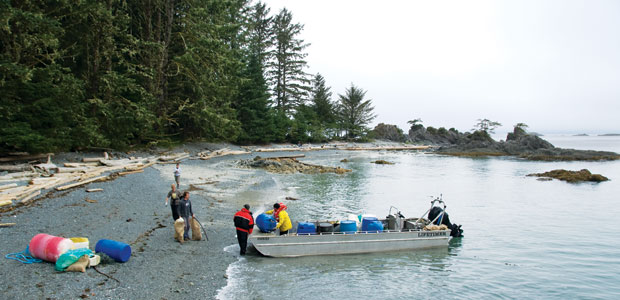Advertisement
Volunteers for the Environment
Make a difference

We are so closely connected to other forms of life on our planet that survival without them is unthinkable. And although we have the power of intellect, we can never consider ourselves as superior. On the contrary, we need these species in order to survive.
Doesn’t it make sense, then, to use our intellectual and physical abilities to contribute every effort to help rebuild, maintain, and protect our environment?
Large environmental groups make us aware of problems around the world and help deal with the challenges of solving them. But they can’t do it all. Countless devoted people volunteer their time to help make a difference in the health of our local environments.
Clearing the Way for Fish
One project that many community environment groups have in common is cleaning up local creeks and rebuilding their damaged banks. Adults and students of all ages help to increase local fish populations by removing litter and debris from the creeks.
In some areas they remove invasive plant species such as blackberries, then plant trees and shrubs that have high habitat values. Wherever possible, they build walking trails along the banks, creating enjoyable natural settings that also contribute to the balance of healthy ecosystems.
Fishermen Take Initiative
Humans have been using the oceans as a dumping ground for years. In the past, we threw away natural materials. The oceans were able to “digest” the trash and carry on. But now we are throwing out plastic, metal, and other hazardous wastes. As our garbage has become less decomposable, the harm we are doing to our marine ecosystems has grown substantially.
To help combat this problem, a group of commercial fishermen on Canada’s East Coast organized the Ship to Shore Trash Campaign. They encouraged fishermen and other boaters to bring their garbage to land for disposal rather than dumping it overboard. The result is that fishing boats along the Acadian shore of New Brunswick now bring in about 9,500 kg of trash weekly.
Trash Blitz
While fishermen are cleaning up on the East Coast, West Coasters are also taking matters into their own hands–literally. At the end of each summer, a group of devoted Parks Canada volunteers, along with friends and family, do some island-hopping through the beautiful Broken Islands group in Barkley Sound, off Vancouver Island’s west coast.
Though visitors who camp in these remote islands are generally respectful, volunteers find plenty of trash to fill their large jute bags, much of which is washed ashore by ocean tides.
Protecting Old Forest Growth
When major logging was proposed in their rural area, a fledgling environmental society became concerned about risks to drinking water and wildlife habitat in their community. After six months of reaching out to the public, the group’s membership increased impressively as their efforts gained them support for the cause.
Volunteers became tour guides, outreach event organizers, and fundraisers for money to buy a piece of the wilderness that was slated for logging. In addition, they organized letter-writing campaigns and networked with other conservation partners.
The commitment to their rural community was well-rewarded. The old-growth cedar and spruce are still standing and the creek remains a safe route for salmon on their way to the Pacific Ocean.
Every effort contributes toward a set goal. As the anthropologist and author Margaret Mead put it, “Never doubt that a small group of thoughtful, committed citizens can change the world; indeed, it is the only thing that ever has.”
Small environmental groups contribute to a healthy environment in their communities in many ways, including:
- Putting up bird-nesting boxes
- Picking up garbage along trails
- Cleaning up streams and river banks
- Adopting a street or a beach area
- Planting trees and shrubs
- Educating their community
- Working to preserve wilderness and encourage sustainable forestry practices




